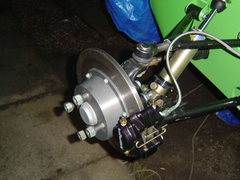I'm using them on my car so I hope all that is true


What's the general consensus on performance calipers eg, Wilwood, that don't use dust seals on the Pistons?
Anyone any experience?
Pat...
Not really any good for the road but plenty use them.....modern bikes tend not to have too much in the way of seals either.
Perhaps somebody out there has some answers?
I'm sure I read on the Brembo website, that calipers without dust seals are not legal for road use.
Although which country this referred to is anyones guess.
I'm pretty sure that there are no legal issues concerning dust seal-less calipers. Using them on the road shouldn't be a problem unless they
are left long enough to get cruddy with brake dust & general road dirt.
I'm using them on my car so I hope all that is true
I'm also hoping that with a Seven type car, the wind etc. will keep brake dust to a minimum.
Pat...
From Brembo's website.
Please remember that in the European Community, Gran Turismo products may only be used in racing and on private roads, unless you have obtained a new
approval in compliance with directive 98/12/EC.
This applies to their GT range, which don't have dust seals.
http://www.brembo.com/ENG/Performance/GranTurismoBrakes/


I don't think this affects the UK though. It might be referring to the abolition of asbestos in the brake linings but it is rather vague. No
mention of dust seals though.
Directive 98/12/EC (OJ L 81, 18.3.1998). Braking devices of motor vehicles. Germany, Greece, Austria, Portugal, Sweden. Agriculture
[Edited on 29-12-05 by RazMan]
Advice from Compbrake here 
The Compbrake site implies that this secondary seal is only there to protect the pistons and caliper body from corrosion - that's not the
case.
The secondary seal will stop the piston from corroding and that is important because a corroded piston can/will damage the fluid seal.
The fluid seal is about 10mm inside the mouth of the piston bore.
But this type of seal also prevents other small particles getting between the piston and caliper body and damaging the fluid seal.
It also protects the piston surface (that slides in the main fluid seal) from mechanical damage. Mechanical damage can/will also damage the main fluid
seal when you push the pistons in during a pad change.
You can cope with most of the issues that occur when you use a caliper without a secondary seal. BUT you must be aware that you can't 'fit
& forget' like they do with regular production cars. I guess we are probably most likely to look after this type of caliper but it does
require more attention than an ordinary M16 etc...
So what are we saying, every week or so, give them a quick spray with brake cleaner???
Pat...
I requested information from wilwood regarding this very point - their calipers packaging comes emblazoned with "not for street use" type
warnings.
Their response was that they used the disclaimers because they had no control of the braking system engineered by the customers & needed to
protect themselves from eejits & litigation.
I asked about the dust seal issue & they said "clean the pistons before you push them back in when you change the pads"
cheers
Bob
Did you buy any Bob and were you satisified with the "clean before you change the pads" comment?
Pat...
Yep, got 'em through rallydesign. Given the frequency of likely pad changes it didn't sound like a problem, sounds like "try not to ram
road grit into the bores". The pistons are stainless so corrosion shouldn't be an issue. Here's a picture


Rescued attachment frbrake.jpg
Found this on a Nissan site to make me feel better:
"Some people are also curious as to why Wilwood does not provide dust boots on most of their calipers. The reason is pretty simple. Wilwood
calipers are designed with ultimate performance in mind, i.e.: they expect their calipers to be used hard, which means high temperatures. Dust boots
turn to a gooey mess or turn hard and brittle when exposed to the temperatures of driving events/track events and in either case, loose any of their
effectiveness to keep road grime off the pistons. When you stop and think about it, this could actually cause a dangerous situation. If you run dust
boot equipped calipers very hard (to the point of corrupting the dust boots ability to keep grime off the pistons) and then push the pistons back into
the caliper without cleaning them, you could unknowingly compromise the piston/caliper seal and possibly cause a brake fluid leak or total failure. As
a final point about dust seals, we have been providing our big brake kits to 300ZX, 350Z and G35 enthusiasts for over 4 years now with customers all
over the world and have yet to have a customer need to rebuild a caliper."
Pat...
Not saying that's incorrect, but if brake temperatures can get so high that the dust cover melts I'd be seriously worried about the integrity of the caliper seal itself afterwards.
quote:
Originally posted by MikeRJ
Not saying that's incorrect, but if brake temperatures can get so high that the dust cover melts I'd be seriously worried about the integrity of the caliper seal itself afterwards.